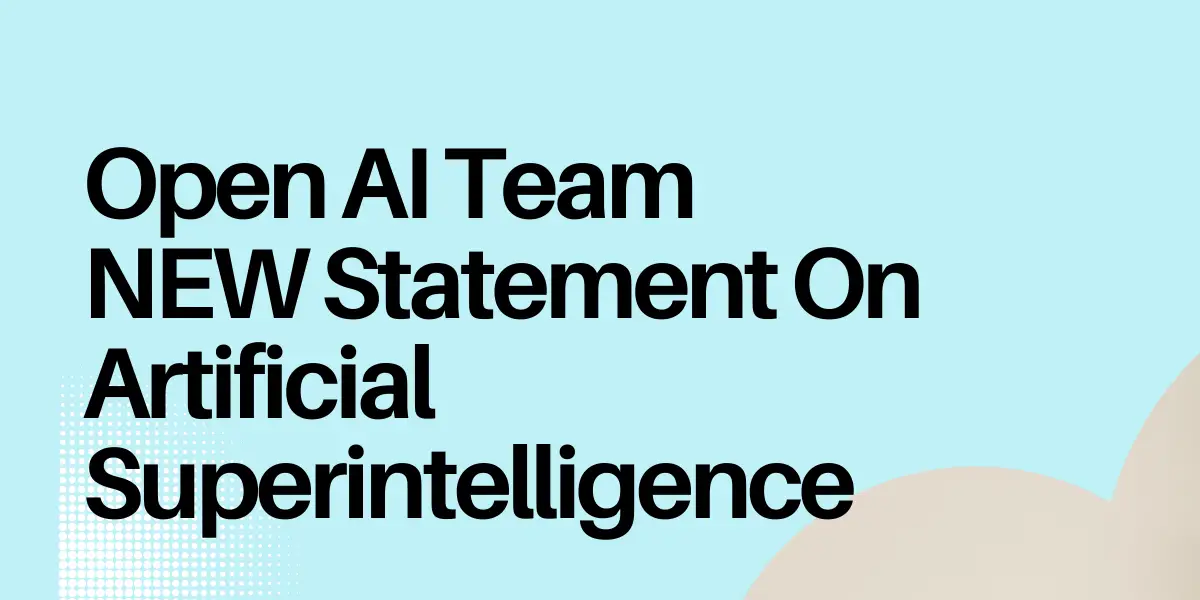Open AI Team NEW Statement On Artificial Superintelligence!

Artificial Intelligence (AI) continues to be a focal point of technological advancement, with the development of increasingly intelligent systems. OpenAI, a leading organization in the AI field, recently made a new statement on the future of AI, specifically focusing on the concept of superintelligence. This article delves into the details of this statement, discusses the implications for the future of AI, and provides insights based on recent developments and discussions in the field.
Table of Contents
What is Superalignment?
Superalignment is a term coined by OpenAI to describe the process of aligning AI systems that are much smarter than humans with human intent. The objective is to ensure that these superintelligent systems adhere to human values and goals, rather than deviating and potentially causing harm. This poses a significant challenge as current techniques for aligning AI, such as reinforcement learning from human feedback, may not scale to superintelligence.
See more:Best 13 Practical AI Websites You Should Try in 2023
The Potential and Risks of Superintelligence
Superintelligence, as described by OpenAI, could be the most impactful technology humanity has ever invented. It holds the potential to solve many of the world’s most pressing problems, such as climate change, world hunger, and incurable diseases. However, the immense power of superintelligence could also be very dangerous, leading to the disempowerment of humanity or even human extinction.
The Role of Alpha Zero
Alpha Zero, a superintelligent AI developed by DeepMind, has demonstrated the potential of superintelligence. It learned to play chess at a superhuman level in a single day, surpassing all expectations. This rapid advancement suggests that superintelligence, which could fundamentally change society, may be a reality within the next five years.
The Future of Superintelligence
OpenAI is dedicating 20% of their compute to building AI systems smarter than humans, aiming for scientific and technical breakthroughs in controlling them within four years. They are assembling a team of top machine learning researchers and engineers to work on this problem. Despite the ambitious goal, they are optimistic that a focused, concerted effort can solve this problem.
Personal Insights and Recommendations
The concept of superintelligence is both fascinating and terrifying. The potential benefits are immense, but so are the risks. As we move forward, it’s crucial that we approach this technology with caution and a deep understanding of its implications.
OpenAI’s focus on superalignment is a promising step towards ensuring that superintelligent AI systems align with human values and goals. However, it’s also a reminder of the challenges we face in controlling and managing these powerful systems.
For those interested in AI and its future, I recommend keeping a close eye on OpenAI’s work in this area. Their research and developments will likely shape the future of AI and have significant implications for society as a whole.
As for policy makers and regulators, it’s crucial to understand the potential impact of superintelligence and to start thinking about how to regulate it effectively. This includes considering not only the technical aspects of AI but also its broader societal implications.
Finally, for AI researchers and developers, the challenge of superalignment presents an exciting opportunity. It’s a complex, unsolved problem that will require innovative solutions. If you’re in this field, consider contributing to this effort. Your work could have a profound impact on the future of AI and humanity.
Conclusion
The development of superintelligence is an exciting yet daunting prospect. It holds the potential to transform our world in ways we can’t yet fully comprehend. However, it also presents significant risks that must be carefully managed. The work of OpenAI and other organizations in this field will be crucial in ensuring that the development of superintelligence benefits humanity rather than harms it.

